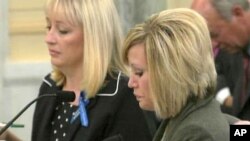Shelley Anderson's blond hair skims the blue ribbon she wears on her lapel in memory of those killed in the Deepwater Horizon oil rig blast. Her husband, Jason, the father of their two small children, was among those killed in the April 20 explosion. "He's everything. He's the breath in my lungs. He's the beat of my heart. He's the skip in my step and the dances that we shared together. All. It's all gone," she said.
Anderson was one of two widows of the Deepwater Horizon oil rig blast who testified before the U.S. Senate's Commerce, Science, and Transportation Committee Wednesday, as lawmakers discussed industry accountability and compensation for families of those killed on the rig. Lawmakers have held more than 40 hearings on the blast and the oil spill that has lasted for more than 70 days.
"It is my understanding today that Transocean, the owner of the Deepwater Horizon, is seeking to limit its liability for this loss in federal court under a legal loophole that is both unconscionable and outdated," said Committee Chairman Senator John Rockefeller, a Democrat from West Virginia.
Existing U.S. laws limit damages when someone wrongfully dies at sea as opposed to on land.
Maritime laws that date back to the 1850s and 1920s allow people to be compensated for funeral expenses and the loss of the victim's earnings. But the laws do not allow compensation for the loss of a loved one's presence and companionship.
Maritime law expert Tom Galligan says laws governing the seas have not caught up to laws on the land, and he urges Congress to make revisions. "Senators, a spouse, child or parent who loses a loved one suffers a very real loss, as we have heard, and the law, to be just, must recognize it," he said.
Natalie Roshto's husband, Shane, also was killed in the Deepwater Horizon explosion.
At times wiping away tears, Roshto told lawmakers that her husband, who was in his early 20s, worked on the offshore rig because it paid well enough for her to go to college and to care for their young son, Blaine. She was not able to get her diploma after her husband's death.
Roshto says drilling rig companies would pay greater attention to worker safety if there were greater financial stakes. "Because they knew. They knew the law. They knew that they could just throw these men out other and just, you know, give them a little safety every now and then and if something happened, they didn't think that we'd be sitting here today doing this," she said.
Transocean has said it will honor all of its legal obligations arising from the Deepwater Horizon incident, but the company has also petitioned for all lawsuits to be heard in one court before a single judge and paid from a single fund.
Aside from the personal tragedies, there is an environmental one, as an estimated 560 million liters of oil have spilled into the Gulf of Mexico since the accident.
New Jersey Democratic Senator Frank Lautenberg held aloft a glass jar of oily water from the Gulf. "This is it, as ugly as it is, and you see what happens when this carelessness -- carelessness -- took over," he said.
In a separate hearing on Capitol Hill Wednesday, Kenneth Feinberg, the administrator of the BP Deepwater Horizon Compensation Fund, said he hopes that he can provide prompt pay-outs to help small businesses that have been affected by the oil spill.
More than 80,000 individuals and businesses have submitted compensation claims to that $20 billion fund provided by BP.
Widows of Oil Rig Blast Victims Tell of Personal Losses
- By David Dyar




